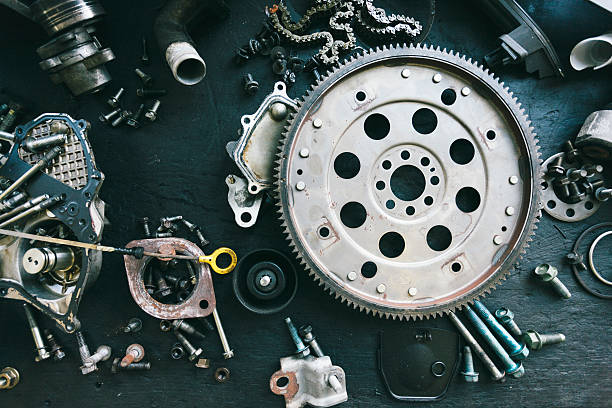Industrial gas turbines play a crucial role in various industries, including power generation, oil and gas, and aerospace. These machines are designed to operate under extreme conditions and perform efficiently for long periods. However, over time, certain components of gas turbines may wear out or become damaged, requiring refurbishment or replacement. Refurbished parts offer a cost-effective solution, but it is essential to ensure their quality through rigorous quality control measures.
What are refurbished industrial gas turbine parts?
Refurbished industrial gas turbine parts are components that have been previously used but have undergone a series of processes to restore their performance and extend their lifespan. These parts are typically sourced from decommissioned gas turbines or those removed during routine maintenance. Refurbishment can involve cleaning, repairing, reconditioning, or even remanufacturing the parts to meet or exceed original equipment manufacturer (OEM) specifications.
The role of quality control in refurbished parts
Quality control is crucial in the refurbishment of industrial gas turbine parts to ensure that they meet the required standards and can be safely and reliably used in gas turbines. The following are some key reasons why quality control is of utmost importance in this process:
1. Safety and Reliability
Gas turbines operate in demanding environments, often subjected to high temperatures, pressures, and rotational speeds. Any failure or malfunction of a refurbished part can have severe consequences, including equipment damage, production downtime, and even safety hazards for personnel. Quality control measures help identify any defects or weaknesses in the refurbished parts and ensure that they are repaired or replaced before being installed in a gas turbine. This helps maintain the safety and reliability of the turbine and reduces the risk of unplanned breakdowns or accidents.
2. Performance Optimization
Refurbished parts need to perform at their best to maintain the overall efficiency and performance of the gas turbine. Quality control processes focus on ensuring that the parts meet the required specifications and performance standards. Thorough inspection and testing of the refurbished parts help identify any deviations from the desired performance characteristics. This allows for necessary adjustments or repairs to be made to optimize the performance of the parts and, consequently, the gas turbine as a whole.
3. Cost-effectiveness
Refurbished parts provide a cost-effective alternative to purchasing brand new components. However, this cost advantage can quickly diminish if the quality of the parts is compromised. Poor-quality refurbished parts may fail prematurely, leading to increased maintenance and replacement costs. By implementing robust quality control measures, suppliers of refurbished industrial gas turbine parts can ensure that the parts meet the required quality standards and provide a reliable and cost-effective solution to their customers.
Quality control processes for refurbished industrial gas turbine parts
The quality control processes for refurbished industrial gas turbine parts involve a series of steps to ensure that the parts meet or exceed the required standards. These processes may include:
1. Inspection and Testing
Thorough inspection and testing are essential to identify any defects or deviations from the required specifications. This can include visual inspections, dimensional measurements, material testing, and non-destructive testing techniques such as ultrasonic or magnetic particle testing. These tests help detect cracks, corrosion, wear, or any other potential issues that may compromise the performance or safety of the parts.
2. Repair and Refurbishment
If any defects or damages are identified during the inspection and testing phase, appropriate repair or refurbishment measures are undertaken. This can involve cleaning, polishing, welding, machining, or replacing certain components. The goal is to restore the part to its original condition or better, ensuring that it meets the required specifications and performance standards.
3. Documentation and Traceability
Quality control processes also involve proper documentation and traceability of the refurbished parts. This includes maintaining records of the refurbishment processes, inspections, and test results. This documentation helps ensure transparency and accountability, allowing for traceability of the parts and providing valuable information for future reference or audits.
4. Certifications and Standards
Certifications and adherence to industry standards play a vital role in quality control for refurbished industrial gas turbine parts. Manufacturers should strive to obtain relevant certifications, such as ISO 9001, which demonstrate their commitment to quality management systems. Adhering to industry standards, such as those set by the American Society for Testing and Materials (ASTM) or the International Electrotechnical Commission (IEC), helps ensure that the refurbished parts meet the required performance, safety, and reliability standards.
The benefits of quality control in refurbished parts
Implementing robust quality control measures in the refurbishment of industrial gas turbine parts offers several benefits:
1. Enhanced Safety and Reliability
By identifying and addressing any potential defects or weaknesses in the refurbished parts, quality control measures help improve the safety and reliability of the gas turbine. This reduces the risk of equipment failure, unplanned downtime, and potential accidents, ensuring the smooth and safe operation of the turbine.
2. Improved Performance
Thorough inspection, testing, and optimization of the refurbished parts help ensure that they meet the required performance standards. This contributes to the overall performance and efficiency of the gas turbine, resulting in better energy conversion, reduced fuel consumption, and improved operational costs.
3. Cost Savings
High-quality refurbished parts that undergo rigorous quality control processes can provide significant cost savings compared to purchasing new components. These parts offer a reliable and cost-effective solution, reducing maintenance and replacement costs, and extending the lifespan of the gas turbine.
Conclusion
Quality control is of utmost importance in the refurbishment of industrial gas turbine parts. It ensures the safety, reliability, and performance optimization of these components, benefiting various industries that rely on gas turbines for their operations. By implementing rigorous quality control measures, manufacturers of refurbished parts can provide cost-effective solutions while maintaining the highest standards of quality and performance.





